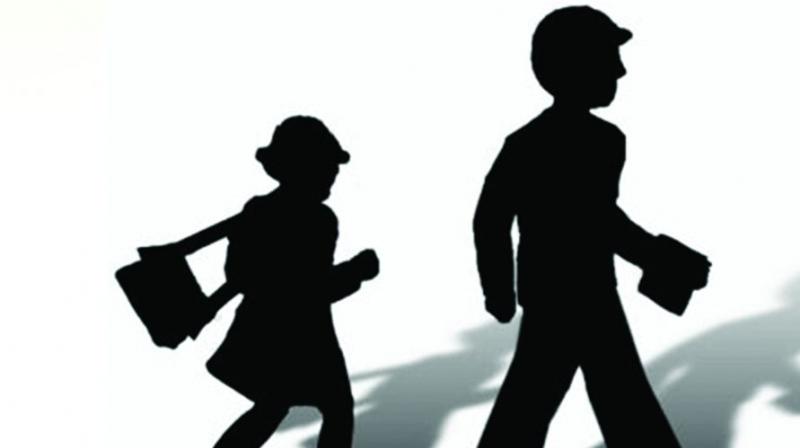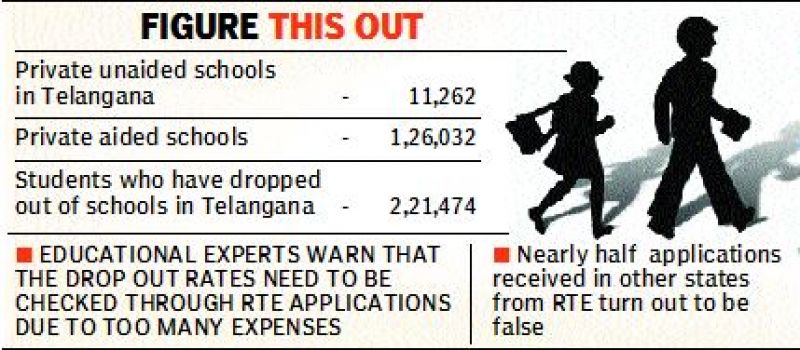Schools, Telangana engage in blame game over RTE implementation
Nearly half applications received in other states from RTE turn out to be false.

HYDERABAD: The State Education Board has issued notices asking schools about their reservation policies after facing flak for the dissatisfactory implementation of the Right to Education (RTE) Act in the state.
According to Section 12 (1) (c) of the RTE Act, 25 percent of the seats at private and unaided schools are to be reserved for students from economically weaker sections of society. Such students are to be educated for free until the age of 14.
While most other states have ensured that the act is implemented, experts say that private and unaided schools in Telangana continue to exclusively admit only children from families that are relatively well-to-do.
In Karnataka, nearly one lakh seats at private schools have been filled by students from economically weaker sections of society. Meanwhile, schools in the state have washed their hands of the matter by saying that it is not feasible for them to reserve seats and offer free education unless the government reimburses them.
Usha Reddy, the principal of Meridian School, says, “We cannot follow the RTE Act unless the government comes up with a way to reimburse the fees that are waived for students from backward sections.”
Some schools are implementing the reservation policy as outlined in the constitution, but not as it is outlined in the RTE Act. Narasimha Reddy, the principal of Hyderabad Public School, Ramanthapur, says, “About 22 per cent of our seats are reserved for SC and ST students, and students from other backward classes. We cannot afford to reserve another 25 per cent of our seats as per the RTE unless the government funds the programme, or else we will have to hike the fees of our other students, which will be unfair to them.”

Other schools offer students from economically-backward classes scholarships and subsidies. “We have scholarships for underprivileged students. We offer them subsidies for the purchase of books and uniforms. Though we are not implementing the RTE Act, we are trying to do our bit. We cannot afford to provide free education,” says Deepthi Divakar, a teacher.
Meanwhile, activists say that schools and the government are blaming each other for failures in the implementation of the RTE Act.
Educational expert Laxmi Rao says, “The Act was created with the intention of ensuring that all children had access to quality education, free of cost. But it has not been implemented properly in the country. The government should develop a financial arrangement so that the RTE Act is implemented.”
N. Narayana, the president of the Telangana Parents’ Association, says that they have staged several protests demanding the implementation of the RTE Act. “GO No. 44, which deals with the RTE, is pending in the High Court. Meanwhile, parents are forced to shell out exorbitant fees, which many of them cannot afford, to ensure that their children receive quality education.”
RTE too big a burden for schools
Schools say that inclusive education imposes a burden that is too big for them to bear alone. They also seek clarity regarding the implementation of the Right to Education (RTE) Act. They want to know whether fees other than tuition fees are also to be waived for students who occupy reserved seats.
Maya Suresh, a member of a parent association asks, “When middle-class parents are forced to avail of loans to pay their children’s tuition fees, how can we expect parents from economically weaker sections of society to pay the fees for extracurricular activities and school events?”
Members of the Telang-ana Progressive Teachers’ Federation believe that the RTE Act will remain a failed attempt at making education inclusive unless its implementation is strictly monitored. M. Ravinder, the president of the organisation, says, “Malpractices will continue if the Act is implemented without careful consideration. Many fake applications are received for admission under the RTE. Other states have set up elected bodies to peruse the applications. We have also heard of students admitted under the RTE being allotted under-qualified faculty and poor accommodation facilities. We should be able to ensure that they are treated as equal to other students throughout their schooling.”
The RTE has been implemented effectively in Odisha, where 25 per cent of the seats in all schools are reserved for students from economically weaker sections of society. Parents in Telangana say that we have something to learn from our neighbours.
N. Narayana, the president of the Telangana Parents’ Association, says, “The government needs to act to ensure that the benefits of the RTE Act reach rural areas as well, especially in light of recent decisions to shut down government schools. Where will our children study if the doors of government schools shut, and we cannot afford private schools?”
